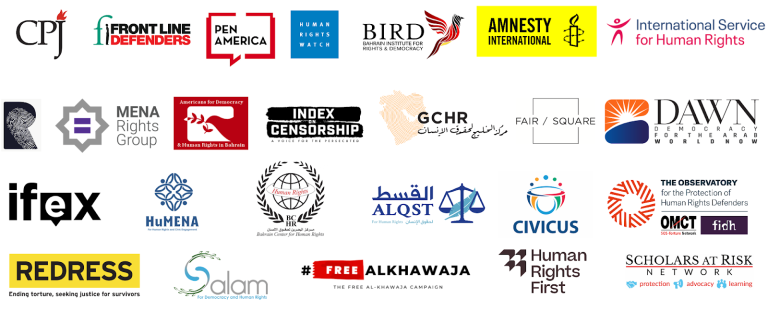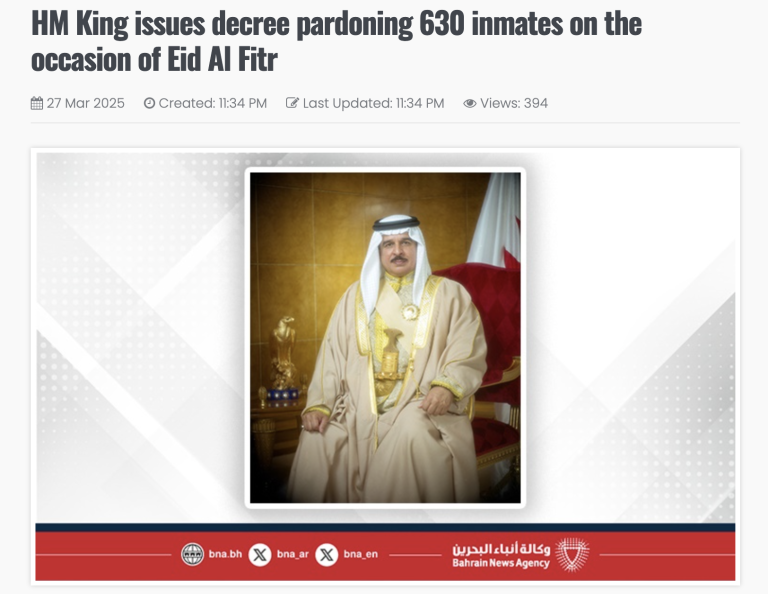[fusion_text]
In the latest chapter of Nabeel Rajab’s unfair prosecution, on the morning of 6 October 2016 a Bahrain high court postponed the leading human rights defender and Bahrain Center for Human Rights president’s sentencing to 31 October. Until then, Rajab will continue to remain detained in solitary confinement – a form of ill-treatment which can amount to torture. Of all Bahrain’s international allies, the United Kingdom in particular has a duty to use its leverage to secure the release of Rajab, as well as all other prisoners of conscience. The UK has to make strong statements, and it has to take strong action. So far, they have done neither.
The importance of Nabeel Rajab’s case is well established. His relentless advocacy work, his status as one of the last free Bahraini human rights defenders still operating in their home country, and the reality that the charges he faces are nothing short of ludicrous, have seen his story captivate the headlines on Bahrain. To many, both inside Bahrain and out, he has become a beacon of hope for change.
It is worth recounting his latest arrest in brief: Rajab was arrested on 13 June, on the opening day of the 32nd UN Human Rights Council – sending a clear message regarding Bahrain’s view on that institution – and prosecuted him on charges of “insulting a statutory body”, “spreading rumours in war time” and “insulting a neighbouring country”. The first two charges were not new, and had first been brought against Rajab in April 2015 and held against him to silence him. Between the three charges, he faces up to 15 years in prison. After he wrote his Letter from a Bahraini Jail to the New York Times, the prosecution brought a new charge of “undermining the prestige of the state”, which could add a further year in prison.
Ahead of the last court hearing, Human Rights Watch asked whether parallels ought to be drawn between Rajab and Nelson Mandela. They commented on the similarities between them, their respective roles as human rights defenders against discrimination, but also their differences. While Apartheid South Africa faced boycott action for its human rights abuses 30 years ago, many states have failed to criticise Bahrain for their actions.
However, there has been a changing tide in international opinion on the matter. The US State Department, the UN High Commissioner for Human Rights and the EU Special Representative for Human Rights have each voiced their own concerns for Rajab and either called or “hoped” for his release. The United Kingdom have expressed concern, but not called for his release – indeed, they have not called for the release of a single prisoner of conscience in Bahrain.
At the 33rd Human Rights Council in September, Rajab’s ordeal was also a key influence on the international criticism directed toward Bahrain as numerous states slated the country’s treatment of human rights defenders. The past week has even seen the United States move beyond rhetoric; Bloomberg have reported that sanctions may be placed on the sale of fighter jets to Bahrain by the if human rights progress is not made.
Fast forward to the morning of the last trial date, and the actions of the Bahraini government to further postpone Rajab’s fate are a clear indicator that Bahrain is feeling the heat from the international community.
Rajab returned to his cell after the trial, back into solitary confinement and the whim of an abusive police force, on charges which flagrantly violate his right to free expression. The adjournment of Rajab’s trial to the end of the month appears to be less about due process and more about finding a more “favourable” time to sentence him in, when the spotlight is no longer shining on Bahrain.
It is time now to build on the headway made by the US, the UN and the EU and time for the British government to act. As Bahrain’s closest Western ally in recent years, the British government must put human rights above geopolitics and call directly for both Rajab’s release and meaningful reform in Bahrain. To do anything less, while maintaining stellar security, military and royal-to-royal relations – King Hamad sat with the Queen at her 90th birthday celebration and Prince Charles is due to visit the country in November – is to enable to Bahraini government.
Ben Fletcher is an advocacy intern at BIRD.
[/fusion_text]





